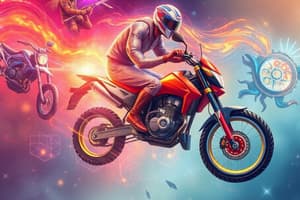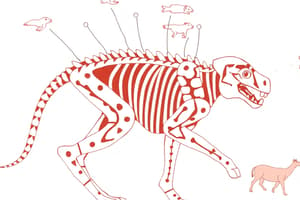Podcast
Questions and Answers
Which condition is NOT mentioned as beneficial for massed practice to be effective?
Which condition is NOT mentioned as beneficial for massed practice to be effective?
- Long attention spans
- High motivation
- Good physical condition
- Previous experience in the task (correct)
What type of wearables primarily help in analyzing performance to identify strengths and weaknesses?
What type of wearables primarily help in analyzing performance to identify strengths and weaknesses?
- Performance analysis tools (correct)
- Fitness trackers
- Smart Clothing
- Smart Watches
Which of the following is NOT a method of feedback provided by wearables in motor skill acquisition?
Which of the following is NOT a method of feedback provided by wearables in motor skill acquisition?
- Peer evaluation (correct)
- Tactile cues
- Auditory cues
- Visual cues
Which wearable technology is specifically used in cricket to detect ball contact with the bat?
Which wearable technology is specifically used in cricket to detect ball contact with the bat?
What is a primary advantage of self-controlled practice in learning?
What is a primary advantage of self-controlled practice in learning?
What is the primary factor that determines how often demonstrations should be provided?
What is the primary factor that determines how often demonstrations should be provided?
What practice strategy should be used once basic movement patterns have been acquired?
What practice strategy should be used once basic movement patterns have been acquired?
Which type of error occurs when a learner fails to comprehend the skill requirements?
Which type of error occurs when a learner fails to comprehend the skill requirements?
When should manual guidance be withdrawn during skill acquisition?
When should manual guidance be withdrawn during skill acquisition?
What is low contextual interference characterized by?
What is low contextual interference characterized by?
Which practice method combines the advantages of blocked and random practice?
Which practice method combines the advantages of blocked and random practice?
In diagnosing errors, what is often emphasized by practitioners?
In diagnosing errors, what is often emphasized by practitioners?
What factors should be considered before correcting a learner's error?
What factors should be considered before correcting a learner's error?
When should random practice be introduced in a learning sequence?
When should random practice be introduced in a learning sequence?
What type of practice is recommended for complex skills that involve a degree of risk?
What type of practice is recommended for complex skills that involve a degree of risk?
What is the first stage in the process of reaction time that involves attaching meaning to sensory information?
What is the first stage in the process of reaction time that involves attaching meaning to sensory information?
Which factor is NOT mentioned as influencing reaction time?
Which factor is NOT mentioned as influencing reaction time?
What does the term 'reaction time' refer to?
What does the term 'reaction time' refer to?
During which phase is the decision made on how to respond to the sensory information?
During which phase is the decision made on how to respond to the sensory information?
What must practitioners distinguish between when addressing delays in response time?
What must practitioners distinguish between when addressing delays in response time?
What is one of the primary functions of sport watches for athletes?
What is one of the primary functions of sport watches for athletes?
Which stage of motor learning focuses on refining skills through practice and feedback?
Which stage of motor learning focuses on refining skills through practice and feedback?
How does personalized training benefit athletes according to the concepts discussed?
How does personalized training benefit athletes according to the concepts discussed?
What are invariant features in a generalized motor program?
What are invariant features in a generalized motor program?
Which of the following is NOT a primary function of wearables in sport?
Which of the following is NOT a primary function of wearables in sport?
What is described as the automatic execution of skills, allowing focus on other aspects?
What is described as the automatic execution of skills, allowing focus on other aspects?
What future trend involves the use of immersive simulations for skill development?
What future trend involves the use of immersive simulations for skill development?
What does an athlete rely on to specify parameters based on their experiences during practice?
What does an athlete rely on to specify parameters based on their experiences during practice?
Which category of constraints includes body shape, weight, and cognitive factors?
Which category of constraints includes body shape, weight, and cognitive factors?
What does the dynamical systems theory argue about the nature of movement?
What does the dynamical systems theory argue about the nature of movement?
In the context of motor control, what is meant by an 'attractor state'?
In the context of motor control, what is meant by an 'attractor state'?
What role does the practitioner play in a constraints-led approach?
What role does the practitioner play in a constraints-led approach?
Which type of constraint refers to the rules of a game and goals of a task?
Which type of constraint refers to the rules of a game and goals of a task?
What happens to the movement pattern when a change in constraints occurs?
What happens to the movement pattern when a change in constraints occurs?
Which of the following is an example of an environmental constraint?
Which of the following is an example of an environmental constraint?
What does the constraints-led approach suggest about learning motor skills?
What does the constraints-led approach suggest about learning motor skills?
Flashcards
Perception
Perception
The process of giving meaning to incoming sensory information, allowing us to understand the world around us.
Response Selection
Response Selection
The stage where we decide what action to take based on the perceived information.
Response Programming
Response Programming
Retrieving a pre-programmed sequence of movements from memory, ready for execution.
Reaction Time
Reaction Time
Signup and view all the flashcards
Psychological Refractory Period
Psychological Refractory Period
Signup and view all the flashcards
Demonstration Setup
Demonstration Setup
Signup and view all the flashcards
Demonstration Frequency
Demonstration Frequency
Signup and view all the flashcards
Error Causes
Error Causes
Signup and view all the flashcards
Error Diagnosis
Error Diagnosis
Signup and view all the flashcards
Error Correction
Error Correction
Signup and view all the flashcards
Blocked Practice
Blocked Practice
Signup and view all the flashcards
Random Practice
Random Practice
Signup and view all the flashcards
Repeated-Blocked Practice
Repeated-Blocked Practice
Signup and view all the flashcards
Distributed Practice
Distributed Practice
Signup and view all the flashcards
Contextual Interference
Contextual Interference
Signup and view all the flashcards
What do wearables in sports collect?
What do wearables in sports collect?
Signup and view all the flashcards
How do wearables help with performance analysis?
How do wearables help with performance analysis?
Signup and view all the flashcards
How do wearables provide real-time feedback?
How do wearables provide real-time feedback?
Signup and view all the flashcards
What are the different types of wearables?
What are the different types of wearables?
Signup and view all the flashcards
How do wearables enhance sports performance?
How do wearables enhance sports performance?
Signup and view all the flashcards
Dynamical Systems Theory
Dynamical Systems Theory
Signup and view all the flashcards
Constraints
Constraints
Signup and view all the flashcards
Organismic Constraints
Organismic Constraints
Signup and view all the flashcards
Environmental Constraints
Environmental Constraints
Signup and view all the flashcards
Task Constraints
Task Constraints
Signup and view all the flashcards
Attractor State
Attractor State
Signup and view all the flashcards
Movement Exploration
Movement Exploration
Signup and view all the flashcards
Role of the Practitioner
Role of the Practitioner
Signup and view all the flashcards
Generalised Motor Program
Generalised Motor Program
Signup and view all the flashcards
Invariant Features
Invariant Features
Signup and view all the flashcards
Parameters
Parameters
Signup and view all the flashcards
Schema
Schema
Signup and view all the flashcards
Cognitive Stage
Cognitive Stage
Signup and view all the flashcards
Associative Stage
Associative Stage
Signup and view all the flashcards
Autonomous Stage
Autonomous Stage
Signup and view all the flashcards
Coordination
Coordination
Signup and view all the flashcards
Study Notes
Week 1: Introduction to Motor Learning and Control and Classification of Skills
- Effective learning design needs a plan based on understanding the learning process, current situation, and available strategies.
- Motor learning studies the processes and factors influencing skill acquisition.
- Motor control focuses on neural, physical, and behavioral aspects of movement.
- Learning is a permanent change in skill execution, while performance is executing a skill.
- Motor skills are classified:
- Gross vs. fine motor skills based on movement precision.
- Discrete, serial, or continuous based on movement organization.
- Open vs. closed skills based on environment predictability.
- Multidimensional classification based on skill context and requirements.
- Individual differences affect learning effectiveness.
- Abilities and potential for skill are genetically determined.
Stages of Learning
- Fitts and Posner's stages of learning:
- Cognitive: Basic movement pattern development.
- Associative: Movement pattern refinement.
- Autonomous: Virtually automatic skill performance.
- Gentile's two-stage model emphasizes the goal and the influence of task and environmental characteristics on the movement.
- Stage 1: Understanding the movement goal.
- Stage 2: Fixation (closed skill)/diversification (open skill)
Week 2: Information Processing and Reaction Time
- Perception (stimulus identification) is attaching meaning to sensory information.
- Response selection involves deciding what action to take.
- Response programming retrieves and executes the necessary motor plan.
- Reaction time is the delay between stimulus and response initiation.
- Factors influencing reaction time include processing demands, response choices, anticipation, psychological refractory period, and compatibility.
- Practitioners need to distinguish between slow movement initiation and the need to slow down movement.
Week 3: Skill Presentation: Instructions and Demonstration
- Hands-on vs. hands-off instruction approaches
- Hands-on: Verbal instructions, demonstrations, feedback.
- Hands-off: Focuses on movement exploration.
- Instructional considerations:
- Keep explanations simple and concise.
- Use appropriate terminology.
- Focus learners' attention on critical skill elements.
- Consider previous experiences and learning styles.
- Verbally guide learners' attention for superior learning.
- Demonstrations should consider content, model characteristics, organization, and frequency.
- Performing the entire skill demonstrates the movement pattern.
- Learners benefit from visualizations focusing on coordination.
- Visual aids for demonstration are useful for optimal viewing angle.
- Adapt demonstration to learners' understanding of the skill complexity.
- Manual assistance is permitted for safety and to convey skill requirements.
Week 4: Practice Schedules
- Constant practice on a new skill is initial.
- Variable practice, varying the task execution, is better for more complex tasks or skills.
- Open vs. closed skills:
- Open skills benefit from inter-trial variability (varying non-regulatory conditions).
- Closed skills benefit from constant regulatory conditions.
- Increasing contextual interference (switching between tasks) improves learning.
- Blocked practice (repeating one skill) is for initial learning.
- Random practice is useful when learners have proficiency.
- Shorter, frequent practice sessions improve learning.
- Distributed practice, shorter sessions more frequently, is best for novel and complex skills.
Week 5: Wearables in Sport
- Wearable technology collects data like heart rate, location, and movement patterns.
- This data aids in performance analysis and identifying strengths/weaknesses.
- Wearables support personalized training strategies.
Week 7: Real-Time Feedback and Performance Analysis
- Real-Time Feedback provides immediate feedback.
- Existing technology in sport assists by providing specific data relating to performance.
- Wearables provide various data types, including auditory, visual, and tactile cues.
- Real-time feedback corrects errors.
- Personalized Training: Tailored feedback to individual needs and performance.
Week 8: Motor Programs
- The original notion of motor programs had inherent problems in that it viewed skills as pre-set movements.
- The generalized motor program resolved these issues by representing a class of actions, which can be modified.
- The dynamic system theory emphasizes the interaction between the learner, task, and environment.
Week 9: Constraints-Led Coaching – Dynamical Systems Theory
- Dynamic System Theory: Movement emerges from the interaction between the learner, task, and environment.
- Three constraint categories: Organismic, environmental, task.
- Constraints-led approach: Learners search for optimal movement in response to these constraints.
- Practitioners identify and manipulate key constraints to guide learning.
- This approach focuses on movement as a product and highlights the interaction of the learner and their environment.
Studying That Suits You
Use AI to generate personalized quizzes and flashcards to suit your learning preferences.




